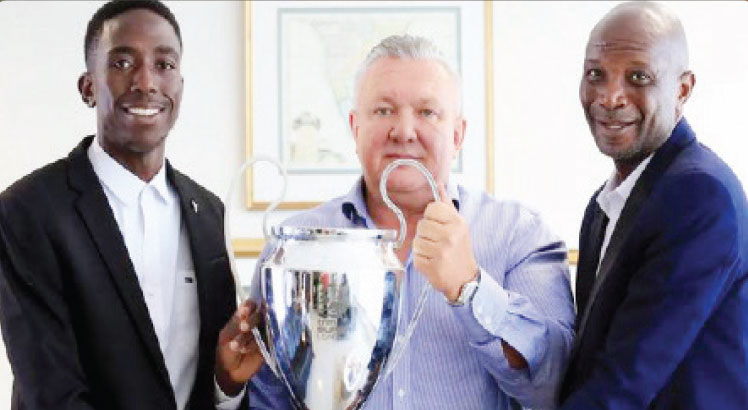IMF provides guarded view
International Monetary Fund (IMF) first deputy managing director Gita Gopinath has given a guarded view on Malawi’s fate, commending bold reforms to restore economic stability, but stressed on fiscal discipline to consolidate the gains made.
In an interview on the sidelines of a meeting with President Lazarus Chakwera, Minister of Finance and Economic Affairs Sosten Gwengwe and Reserve Bank of Malawi (RBM) Governor Wilson Banda at Kamuzu Palace in Lilongwe on Tuesday, she said she was satisfied with the progress the Malawi Government has made in terms of implementing the economic and governance reforms it committed to in the Staff Monitored Programme with IMF Executive Board Involvement (PMB) signed last November.

The IMF deputy chief, in a statement posted on the fund’s website www.imf.org, said the progress of the reforms will help “restore macroeconomic stability, which will set the stage for stronger durable growth and poverty reduction”.
The statement further stated that during the meeting Gopinath discussed policies that “would be necessary to solidify the country’s hard-won gains”.
She said: “Securing a debt treatment would be vital for macroeconomic stability and ensure that additional financing could be used to address Malawi’s pressing developmental challenges. Moreover, strengthening fiscal discipline and addressing weaknesses in governance remains essential.”
In an interview after the meeting, Gwengwe said he was cautiously optimistic that the progress the Chakwera administration has made in implementing “bold economic reforms” would place Malawi on track to transition to an Extended Credit Facility (ECF) deal.
However, he said if clinched, the ECF will have to be backed by strong fiscal and governance reforms to stabilise the local economy in the long-term.
Said Gwengwe: “The ECF is not a silver bullet on its own. We will need to continue with the reforms. We will need to continue with the fiscal discipline we’ll need to continue doing what we’ve been doing in the PMB programme, even when the ECF comes back.”
On the debt restructuring strategy, a key benchmark in the existing Rapid Credit Facility (RCF) programme, the minister said Malawi has made significant progress in negotiations with its creditors, but stressed that the negotiations would not undermine the country’s chances to secure an ECF programme.
He said: “The debt restructuring is an ongoing process and right now we are engaging our two main bilateral donors just to give assurances that they’re part and parcel of this whole debt restructuring process. We don’t have to finish it before ECF, we just need to have assurances that everybody is on board.
“We have also completed the forensic audit on the misreporting of forex and submitted it to the IMF team.”
Gopinath’s visit comes a few days before the fund’s mission is expected to visit the country to assess progress under RCF and Malawi’s readiness for ECF.
Last year, IMF managing director Kristalina Georgieva also reaffirmed the fund’s support to Malawi, but fell short of committing to an ECF programme.
The RCF will expire in October this year, but the IMF has not yet committed that it would grant Malawi an ECF programme.
Reacting to the developments, Malawi University of Business and Applied Sciences associate professor of economics Betchani Tchereni said it is encouraging that the fund recognises progress made to date towards promoting economic stability and the need for external financial support to consolidate its gains.
But while commending RBM for successfully using contractionary monetary policy to stabilise the economy, he said the Ministry of Finance would have to implement strong austerity measures to strengthen the country’s fiscal consolidation strategy.
Said Tchereni: “First, the government will have to cut on external travel which is an unnecessary expense. Second, we have to guard against misprocurement in government MDAs [ministries, departments and agencies] to avoid wasteful spending.”
In a separate interview, economics consultant and researcher Exley Silumbu said Malawi has made progress, but stressed that it would be challenging to promote fiscal consolidation.
“It is challenging for Malawi to have a successful fiscal consolidated strategy. The government expenditures have been rising since the Covid-19 broke out, but the revenue has been subdued. Some of the projects and recovery efforts are still ongoing. So, it is tricky to cut on expenditures,” he said.
During the last review of the RCF programme in July, the IMF said Malawi was in a state of debt distress, unchanged from the assessment made when the country signed the RCF.
Ministry of Finance and Economic Affairs data shows that as at end December 2022, total public debt reached K7.9 trillion, representing 69.93 percent of gross domestic product (GDP).
The country also missed the target to limit the budget deficit to 7.1 percent of GDP. The K1.32 trillion deficit in the 2023/24 financial budget is 8.7 percent of GDP.





